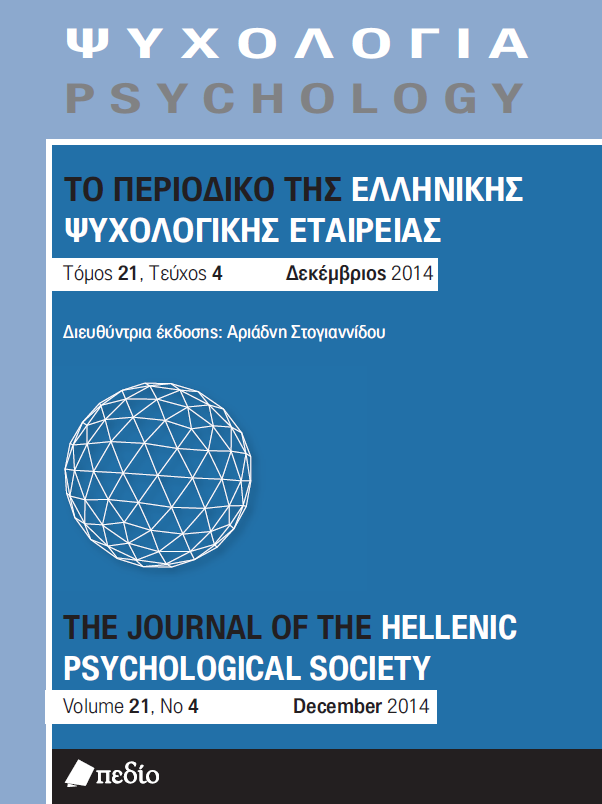Έμφυλες διαφοροποιήσεις στην ψυχική υγεία: θεωρητικές προσεγγίσεις, ευρήματα και προοπτικές

Περίληψη
Το παρόν άρθρο στοχεύει σε μια κριτική και σύντομη επισκόπηση των βασικών θεωρητικών προσεγγίσεων για την εξήγηση των έμφυλων διαφοροποιήσεων στην ψυχική υγεία ακολουθώντας τρεις κατευθύνσεις. Η πρώτη κατεύθυνση αντιστοιχεί στην ψυχολογική προσέγγιση που δίνει έμφαση στις έμφυλες ταυτισιακές διαδικασίες και την ψυχική οργάνωση κατά την πρώιμη παιδική ηλικία, το γνωστικό ύφος και τα ατομικά σχέδια δράσης ανά φύλο. H δεύτερη κατεύθυνση αντιστοιχεί στην κοινωνικο-υλιστική προσέγγιση που ενδιαφέρεται για τις έμφυλες δομικές ανισότητες και τον αντίκτυπο τους στην ψυχική υγεία κυρίως των γυναικών, και η τρίτη, ακολουθεί τις μεταδομιστικές θεωρίες για τη λογοθετική, έμφυλη συγκρότηση της ψυχικής εμπειρίας. Παρουσιάζονται οι θεωρητικές παραδοχές και αντιπροσωπευτικά ευρήματα της κάθε προσέγγισης χωριστά, όπως και οι περιορισμοί ως προς την εξηγητική τους ισχύ. Οι ψυχολογικές σπουδές φύλου στην Ελλάδα έχουν χαμηλή ακαδημαϊκή παρουσία παρά τις επίσημες εκθέσεις αλλά και τα κείμενα των φεμινιστικών κινημάτων της βάσης που δείχνουν την επιδείνωση της θέσης των γυναικών στις περισσότερες κοινωνίες, όπου η γενικευμένη ανδρική κυριαρχία διαιωνίζεται. Αυτή η επιδείνωση έχει συνδεθεί με τα προγράμματα λιτότητας και την μαζική υποχώρηση του κράτους πρόνοιας που μετατρέπει τις γυναίκες σε έναν «εφεδρικό στρατό άμισθης κοινωνικής φροντίδας», και με την αναζωπύρωση του δεξιόστροφου αυταρχισμού σε πολλές κυβερνήσεις κρατών που προωθούν αναχρονιστικές νομοθεσίες αλλά και μια νέου τύπου σεξιστική κουλτούρα.
Λεπτομέρειες άρθρου
- Πώς να δημιουργήσετε Αναφορές
-
Ζήση Α. (2022). Έμφυλες διαφοροποιήσεις στην ψυχική υγεία: θεωρητικές προσεγγίσεις, ευρήματα και προοπτικές. Ψυχολογία: το περιοδικό της Ελληνικής Ψυχολογικής Εταιρείας, 27(3), 144–156. https://doi.org/10.12681/psy_hps.32647
- Ενότητα
- ΘΕΩΡΗΤΙΚΕΣ ΑΝΑΣΚΟΠΗΣΕΙΣ

Αυτή η εργασία είναι αδειοδοτημένη υπό το Creative Commons Attribution-ShareAlike 4.0 International License.
Το περιοδικό ΨΥΧΟΛΟΓΙΑ έχει υιοθετήσει μία πολιτική Platinum open-access. Τα έξοδα υποβολής, επεξεργασίας ή δημοσίευσης των εργασιών καλύπτονται από την Ελληνική Ψυχολογική Εταιρεία. Τα πνευματικά δικαιώματα των δημοσιευμένων εργασιών προστατεύονται από την άδεια 'Creative Commons Attribution-ShareAlike 4.0 International'. Οι Συγγραφείς διατηρούν τα Πνευματικά Δικαιώματα και χορηγούν στο περιοδικό το δικαίωμα της πρώτης δημοσίευσης. Η άδεια αυτή επιτρέπει σε τρίτους, να χρησιμοποιούν την εργασία σε οποιαδήποτε μορφή, με την προϋπόθεση της διατήρησης των διατυπώσεων που προβλέπονται στην άδεια σχετικά με την αναφορά στον αρχικό δημιουργό και την αρχική δημοσίευση στο περιοδικό ΨΥΧΟΛΟΓΙΑ. Επιπλέον, κάθε διανομή της εργασίας οφείλει να γίνεται με τους ίδιους όρους διανομής, δηλαδή με την ίδια άδεια Creative Commons.









